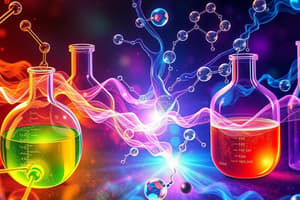Podcast
Questions and Answers
- HCl is an Arrhenius acid because it dissociates in water to produce H⁺ ions.
- HCl is an Arrhenius acid because it dissociates in water to produce H⁺ ions.
True (A)
The Arrhenius theory is only applicable to aqueous solutions.
The Arrhenius theory is only applicable to aqueous solutions.
True (A)
NH3 (ammonia) is considered an Arrhenius base.
NH3 (ammonia) is considered an Arrhenius base.
False (B)
The acid-base theory by Arrhenius is more common than any other theories.
The acid-base theory by Arrhenius is more common than any other theories.
The Arrhenius theory accounts for the behavior of acids and bases in non-aqueous solvents.
The Arrhenius theory accounts for the behavior of acids and bases in non-aqueous solvents.
Acids that fully dissociate in water are called strong acids in the Arrhenius theory.
Acids that fully dissociate in water are called strong acids in the Arrhenius theory.
The Arrhenius theory considers the role of conjugate acid-base pairs in chemical reactions.
The Arrhenius theory considers the role of conjugate acid-base pairs in chemical reactions.
Strong acids completely dissociate in water producing hydrogen ions.
Strong acids completely dissociate in water producing hydrogen ions.
Flashcards are hidden until you start studying



